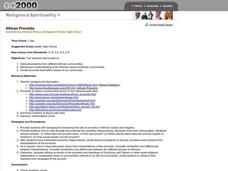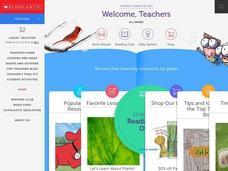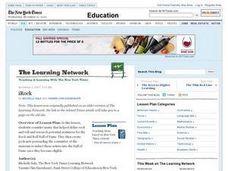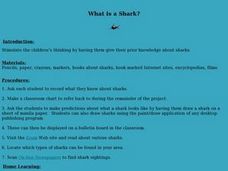Curated OER
Behind the Cover
Students develop questions they would have liked to ask an author about their written works. They read an article about their forefathers and research a back story to a written work of their choice. They create posters to illustrate the...
Curated OER
Advising China
Students express their opinions about how growth and modernization affect nations. Reading an article on China, they discuss the causes and effects of exponential growth in a single town. They research how China has changed by writing...
Curated OER
The Art of Violence
Violence and human suffering, as represented in art and film, are the focus of an investigation of the power of visual images and the moral implications of such representations. Class members examine “Guernica,” Pablo Picasso’s massive...
Curated OER
World War II: Concentration Camps and Refugees
Students explore the experiences of the people in the concentration camps at liberation during World War II. Students read an article on the Liberation of Belsen Concentration Camp and D-Day and report to the class.
Curated OER
Charlotte's Web Trading Card
Students read Charlotte's Web, view variety of trading cards, discuss what they know about trading cards and their purpose, choose character from story, complete bubble map about character, and create character trading card using...
Curated OER
African Proverbs
Students read, interpret and research African proverbs to help them examine the diverse communities in Africa. Students write their own proverbs that reflect their own community and its values.
Curated OER
Opinions, Please!
Young scholars discuss the meaning and purposes of polls and surveys. After reading an article, they analyze the results of a poll given to residents of New York City. They create a survey of their own and analyze the data to write a...
Curated OER
Summer Bummers
Brainstorm popular summer activities and their risks after having your class read an article. They will discover the risks of sun overexposure and in groups develop public service announcements for young people. They also propose a media...
Curated OER
Irregularly Scheduled Programming
Students examine their favorite holidays and how they are celebrated. After reading an article, they discuss the length of television programming for the Super Bowl. In groups, they create their own television programming relating to...
Curated OER
All Aboard the Innovation Train
Students read "Next Stop for the Subway, a Fully Automated Future" from The New York Times and consider the effect of technology on their town or city. After discussing arguments for and against the new computer-based subway system in...
Curated OER
Bow Wow, Oink Oink
Students read Everybody Cooks Rice and discuss birthday celebrations around the world. In this cultural differences instructional activity, students discuss the Chinese symbols by birth years. Students create a graph by...
Curated OER
It's in the Cards
Students discover how art auctions have become competitive after reading an article from The New York Times. Students voice their opinions about specific examples of modern art and create trading cards based on their research of...
Curated OER
What's Up?
Students examine the vocabulary and objects associated with objects in the sky and weather. They observe the sky outside of their classroom and create a list of things in the sky. Students then analyze a poster, read and discuss key...
Curated OER
Welcome to My World!
Students use maps to locate information. They read the story, "It Looked Like Spilt Milk", view images of the continents and discuss the various continents. Afterward, they make their own Atlas to record information that they can later...
Curated OER
iRock
Young scholars explore, listen to and analyze songs that helped define rock and roll music. They read and discuss the article, "They're All Oldies, Dad Included." Research on contemporary artists is conducted and then the students choose...
Curated OER
Gotta Dance
Students share dance moves that reflect their personalities or depict how they are feeling, explore popularity of recreational and competitive social dancing by reading and discussing the article "Follow the Flying Feet,"
present...
Curated OER
Letters from the Japanese American Internment
Young scholars delve into primary research. For this Japanese Internment lesson plan, students make deductions about life in an internment camp by reading and comparing letters written to Clara Breed. Along the way, they consider the...
Curated OER
The House of Dies Drear
Students read The House of Dies Drear and understand how he filled a need and helped people. For this philanthropy lesson students understand how the people who helped on the "Underground Railroad" filled a need and helped others....
Curated OER
Real-World Reasonableness
Fifth graders apply math to real-world situations. In this mathematics instructional activity, 5th graders are read the book, "Math Curse," which discusses ways in which math is used each day. Students then write a sequel to the book in...
Curated OER
Where is Agriculture?
Students explore agriculture. In this agriculture instructional activity, students read "Where is Agriculture?" and discuss all the things that come from agriculture. Students discuss what they need to survive and give examples of...
Curated OER
Characteristics and Functions of Money
Fourth graders discuss the function and characteristics of money. In this financial education lesson plan, 4th graders read the book The Go-Around Dollar by Johnston Adams. This book sparks a conversation on how money is used and the...
Curated OER
Today is Monday - Calendar Math
Young scholars practice memorizing the seven days of the week and keeping them in order. In this calendar lesson, students read aloud the book Today is Monday by Eric Carle, and create their own calendar style book using...
Curated OER
What is a Shark?
Students discuss their knowledge of sharks. In this shark instructional activity, students read about various sharks and look up shark sightings in an online newspaper. They create Shark-shaped poetry.
Curated OER
Deserts: How Do You Define One?
Second graders identify what constitutes as a desert by reading a habitat checklist. In this environment lesson, 2nd graders read a nature website to discover facts about the desert and where they are located. Students...























